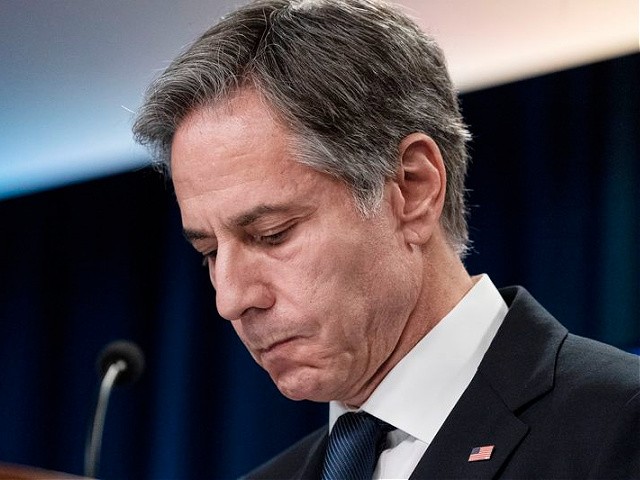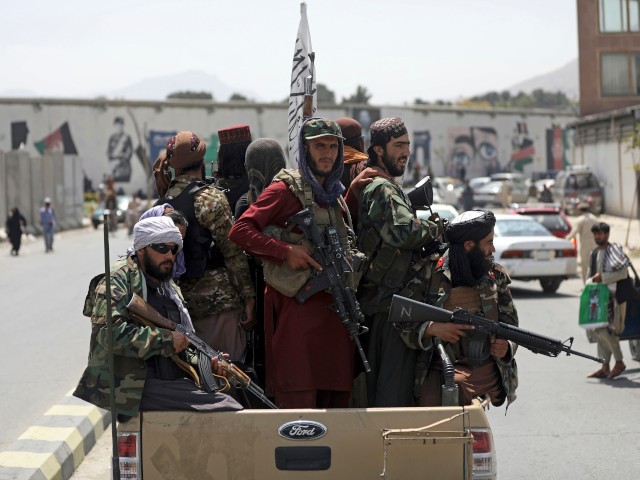Americans who chose to ignore repeated public evacuation notices and no travel notices months before the Taliban takeover of Afghanistan are at fault for getting stranded in the chaos-ridden country, top State Department officials suggested this week.
Mark Krikorian, the executive director for the Center for Immigration Studies (CIS), pushed back against the notion that Americans seeking to leave Afghanistan bear some responsibility for getting stuck.
This week, Secretary of State Antony Blinken and acting U.S. Ambassador to Afghanistan Ross Wilson began blaming some American travelers for getting stranded.

US Secretary of State Antony Blinken speaks about Afghanistan during a media briefing at the State Department,on August 25, 2021, in Washington,DC. – As many as 1,500 US citizens may still need to be evacuated from Afghanistan and the Taliban have pledged to allow some departures after US troops leave on August 31, Blinken said. (Photo by Alex Brandon / POOL / AFP) (Photo by ALEX BRANDON/POOL/AFP via Getty Images)
“While I might be sympathetic to this under some circumstances, the president assured Americans in Afghanistan repeatedly that there was no need to leave quickly because our client govt in Kabul had things under control,” Krikorian wrote on Twitter Wednesday in response to Amb. Wilson’s assertions.
Nearly a month before the Taliban’s aggressive offensive to take over the country culminated with the jihadis entering Kabul on August 15 and declaring victory, the president assured the public Kabul would not fall. The jihadis launched the offensive days after Biden announced the unconditional withdrawal of U.S.-led troops in April.
Nevertheless, Secretary Blinken, echoing comments by Amb. Wilson, a day earlier, indicated on Wednesday that some American travelers bear responsibility for getting stuck in Afghanistan, noting they were warned to leave months before the Taliban takeover but chose to stay.
Blinken declared:
When Americans visit a foreign country or if they reside there, we encourage them to enroll with the U.S. embassy. Whether they do or not is up to them; it’s voluntary. And then, when Americans leave a foreign country, it’s also up to them to de-enroll.
…
Given the security situation in Afghanistan, for many years, we have urged Americans not to travel there. We’ve repeatedly asked Americans who are in Afghanistan to enroll. And since March of this year, we’ve sent 19 separate messages to Americans enrolled with the embassy in Kabul, encouraging and then urging them to leave the country.
He noted that the State Department “amplified” those messages on its official website and social media and even offered to pay for their repatriation.
Since the U.S. evacuation operation began on August 14, “We’ve sent more than 20,000 emails to enrolled individuals, initiated more than 45,000 phone calls, and used other means of communication,” Blinken said.
He asserted that Americans had access to multiple means of communicating with the U.S. State Department if they wanted to leave.
Still, he acknowledged that some Americans in Afghanistan “are understandably very scared.”
The secretary noted that dual nationals have likely resided in Afghanistan for decades and want to stay close to families.
Afghan passengers sit as they wait to leave the Kabul airport in Kabul on August 16, 2021, after a stunningly swift end to Afghanistan’s 20-year war, as thousands of people mobbed the city’s airport trying to flee the group’s feared hardline brand of Islamist rule. (Photo by Wakil Kohsar / AFP) (Photo by WAKIL KOHSAR/AFP via Getty Images)
On Tuesday, Amb. Wilson made similar remarks about some American travelers being at fault for getting stranded in Afghanistan.
He told CBS News that despite warnings months ago for Americans to leave Afghanistan, “People chose not to leave. That’s their business. That’s their right. We regret now that many may find themselves in a position that they would rather not be in. And we are determined to try to help them.”
He failed to mention that both Biden and Blinken denied that the U.S. intelligence community warned in recent weeks that the swift collapse of the Afghan government was probable.
U.S. intelligence agencies said they warned Biden about the potential fall of the Afghan government to the Taliban
Blinken admitted reading a cable in mid-July from over two dozen diplomats, including Wilson, warning of the potential fall of Kabul.
Moreover, intelligence officials from Blinken’s department reportedly warned that Kabul would fall, but State officials ignored the warnings, dismissing them as alarmists.
US charge D’affairs Ross Wilson addresses a press conference at US embassy in Kabul on July 30, 2021. (Photo by SAJJAD HUSSAIN / AFP) (Photo by SAJJAD HUSSAIN/AFP via Getty Images)
CBS News asked Wilson, “Why didn’t the U.S. get out Americans and our Afghani friends before the Taliban were able to take control of Kabul? You warned about this in a cable. Were you ignored?”
The acting ambassador responded:
We put out repeated warnings, every three weeks, to Americans, going back to, I think, March or April, each one in stronger terms, leave now, leave immediately. Never in my 40 years of working — since I began working at the State Department have I seen such strong language used. People chose not to leave.
On Wednesday, Blinken said approximately 1,500 people who may be Americans remain in Afghanistan, including 500 contacted over the past 24 hours, and provided specific instructions on how to get to the U.S.-controlled airport to board an evacuation flight.
However, he said the administration does not know the number for sure, stressing the estimates are fluid.
His comments came a day before suicide bombers reportedly affiliated with the Islamic State (ISIS) attacked the U.S. military-protected Hamid Karzai Airport used for evacuations, killing dozens, including American troops. The attack marked the deadliest single day for U.S. service members in over a decade.
